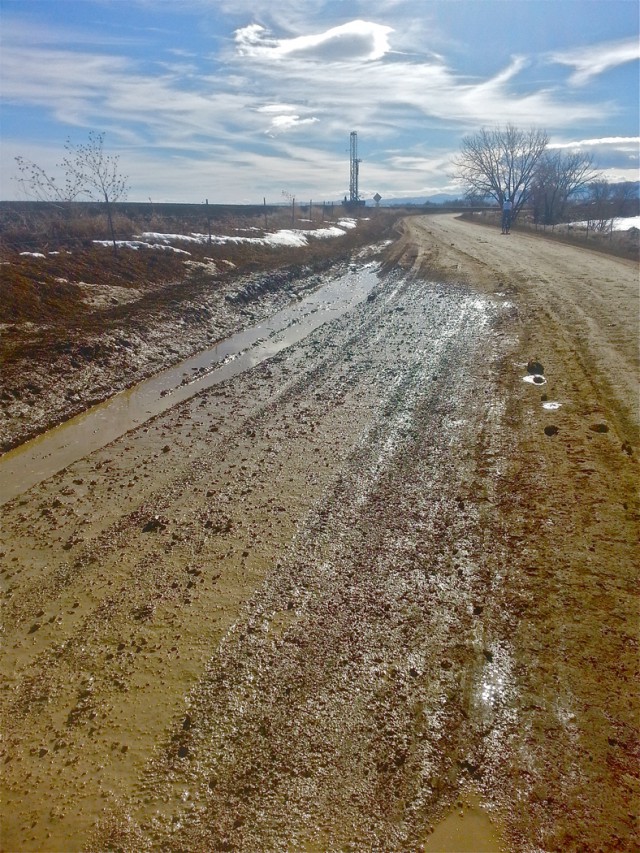
Despite open frustration from fracking opponents, some Longmont city officials say that granting a drilling company permission to build an access road to a well near Union Reservoir gives the city the ability to closely monitor water quality and air emissions.
On Jan. 7, the Longmont City Council voted 4-3 in favor of granting the Synergy drilling company permission to build a 430-foot road across city-owned property to reach a well pad in Weld County, approximately 200 yards from the southeastern shore of Union Reservoir where a swimming beach and dog beach are located. Adding to the controversy, Synergy already had rights of ingress and egress across the property where the well is located. Union North LLC owns the property and granted Synergy permission to build two access roads across the land in 2012.
It is estimated that a single wellsite generates between 38,400 and 172,800 tanker truck trips over its life. Already, Weld County Road 26 between the Synergy wellsite and the lake’s sailing access area to the east has been severely damaged by truck travel to and from the well.
According to the surface use agreement between Longmont and Synergy, the drilling company is responsible for maintaining a gate restricting access from Weld County Road 26 onto the access road. Synergy must also provide “adequate dust mitigation on Weld County Road 26 to the east” of the gate. However, there is no mention of Synergy’s responsibility to maintain more serious damage to Weld County Road 26, indicating an expense that may be passed on to Longmont taxpayers.
While the new access road is within Longmont city limits and within the jurisdiction of the city council to approve, the well itself is located just outside the city and the area covered by its ban on fracking. Longmont City Council member Brian Bagley says that while the city can’t prevent Synergy from operating a well outside city limits, Longmont was able to secure consistent water quality and air emissions monitoring from Synergy in exchange for the access road.
“Through a simple road we could have a voice at the table or none,” Bagley says. “If we have no voice, we have no idea what’s going on at those wells. It’s going to happen no matter what. Longmont controls Longmont — we don’t control Firestone.”
The Colorado Oil and Gas Conservation Commission (COGCC) doesn’t require monthly monitoring of groundwater quality or air emissions. The Colorado Department of Public Health and Environment only conducts infrequent checks on air emissions at drilling operations using infrared cameras.
Craig Rasmuson, chief operation officer for Synergy, says the drilling company hires Fort Collins-based environmental compliance company CGRS to bring infrared cameras to monitor air emissions at the well pad once a month. Synergy also installed water-monitoring systems — something Rasmuson says wouldn’t have occurred had Longmont Mayor Dennis Coombs not requested it in the surface agreement.
“I give a lot of credit to Mayor Coombs. He wanted to make decisions on fact, not on emotions,” Rasmuson says. “He knew he had me in a position where we were willing to do what he was asking for — things that are above and beyond [state requirements] to ensure the safety of his residents.”
Synergy also agreed to keep its trucks off County Road 1, Coombs says, adding, “That’s less pollution, less damage, less traffic on the Longmont roads.”
But not all of Longmont’s city council members are convinced the access road benefits the city, particularly in the face of two lawsuits challenging the city’s oil and gas regulations and ban.
“It sets a bad precedent when we say that we don’t want fracking, but we’ll let [Synergy build an access road] over here. It doesn’t make sense and it’s not consistent,” says Pauline Christensen, city council member at large.
Christensen adds that prior to its Jan. 7 vote, the city council wasn’t informed that Synergy already had access to the well in question via two other roads in Weld County where the well is actually being drilled.
Longmont resident Joan Peck says she believes supposed benefits arising from Longmont’s surface use agreement with Synergy are exaggerated.
“Synergy has always done better water testing quality than other oil companies anyway. I don’t think that had anything to do with Longmont,” Peck says. “I think this is a shot across the bow to us of what is coming down the road. I’m very unhappy that our city council is not thinking long-term.”
Council member Bagley says he is thinking long-term. He wants to show Gov. John Hickenlooper that Longmont’s local laws can exist in harmony with state laws.
“Now we have not just one, but two companies I can point to and say, ‘We’re not against the industry. We’re not against fracking. We’re just against these industries where we live. Get it away,’” says Bagley, referring to Longmont’s previous negotiations with oil and gas company TOP Operating Inc. “It’s not just about a road out of Union Reservoir. It’s not just about we will or we will not have a road. It’s about Longmont having a say in protecting its citizens and about having local control against the state.”
Bagley adds that the city council is fighting both lawsuits from the state in response to the fracking ban and regulations in Longmont “tooth and nail.”
“We’re going to fight it vigorously until it’s over with,” says Coombs. “I can’t predict how the courts are going to rule on that. I know I’ve sworn under oath to protect the city charter, and protecting the city charter is to adamantly defend that lawsuit.”
Respond: [email protected]














